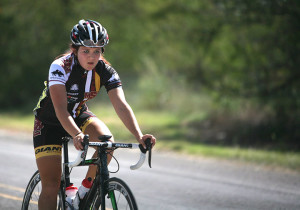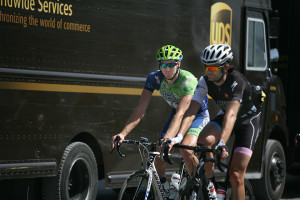
The Hotter’N Hell 100 is a major attraction for cycling enthusiasts, but for professionals and the MSU cycling team, that attraction becomes a battle against elements and fatigue, and in some cases, other riders.
To prevent the dangerous intermingling of a more aggressive, professional style of riding and casual cyclists, officials added a second finish line for competitive cyclists to the event at an out-of-the-way UPS shipping center off Texas 79, 3.9 miles away from the rally finish line downtown.
“Big Brown [UPS] came out as a sponsor so we thought, ‘Let’s just move it down here.’ It worked out well. We haven’t got a lot of negative feedback.” said Robert Clark, HHH steering committee member and vice president of administration and institutional effectiveness.
Given the timing of the race, heat is always a major obstacle, but this year’s competitors were largely unanimous in identifying a tougher obstacle: the wind.
“I pretty much expected it to be hot, super hard and windy. That’s basically what killed me, those crosswinds. It wasn’t really the heat for me. For some people it’s the heat, for a lot of people it’s the crosswinds,” said Garrett Hobbs, exercise physiology sophomore and new member of the MSU cycling team.

Wichita Falls native and psychology senior Angela Streadwick said she also expected the wind to be a factor, especially with such a long race.
“It’s a bike race in Wichita Falls, and it’s a long one so all of those things are kind of to be expected,” Streadwick said. “In Wichita Falls we always have wind and it’s always hot and if you’re racing for 100 miles the heat and the wind and everything are going to get you.”
Claire Fisher, nursing senior, said she competed in the 100K for the second time and was much happier with her results this year.
“Last year I didn’t even start with the pack since I was two minutes late so I had to chase the pack the whole race,” Fisher said. “This year I stayed with them for 26 miles and me and two other girls worked together so I felt stronger.”
Fisher said additional training made the difference this year, keeping her comfortably in the pack.
“I started training in December over Christmas break. I bought a trainer for my house so I could ride indoors, and the whole race season that began in February helped me a lot,” Fisher said. “This summer I really didn’t ride that much because I was up in South Dakota. So this summer I didn’t feel prepared, but today I pushed it because it didn’t feel as hard.”
Les Akins, a 1999 graduate of MSU’s psychology master’s program, said managing the crosswinds is a major component of the race, particularly when it surprises you.
“The race is really about anticipating the environmental changes and also keeping track of who’s doing what, and gauging your efforts,” Akins said. “If you get surprised you better rectify the situation and get to where you’re supposed to be, and the challenge is, there’s 50 other people that know where the place to be is.”
